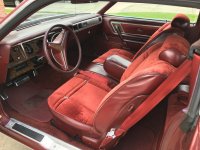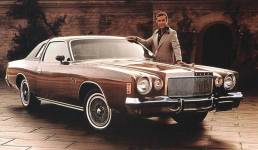Doc1
Has No Life - Lives on TB
Yesterday I went to the post office in my classic '68 Ford pickup. The trip was uneventful and the old truck ran perfectly. I did my business at the post office and returned to my truck to start it.
It did not want to start, with the engine bucking, trying to start and then dying. It didn't sound like an ignition problem and it didn't sound like fuel starvation, though if I was pressed to only make one guess that would've been it. It would crank and "try" to start and rumble and pop a little, but wouldn't quite start. I tried to start it four or five times, hoping that if I could at least get it running I might get a better handle on what the problem was.
The last time I tried to start it, there was a huge explosion which sounded - at least - as loud as a 30-06 rifle being fired! This was not an opportune location for such a detonation, as I was next to the post office and directly across the street from the county courthouse! I tried the starter once again and this time she fired right up and seemed to run perfectly... except for being very loud. I figured I'd best skeedaddle before a SWAT team showed up, so immediately drove away a couple of blocks to an open parking lot.
I popped the hood and, paying close attention to the header pipe, didn't see anything amiss. It had been raining so the parking lot was soaked, but I nonetheless got down on my hands and knees to check the undercarriage. Upon doing this, I saw that my (newish) muffler - which looks like a long, galvanized can - had exploded and was split from end to end along its seam, with the seam edges blown apart and out!
Since the muffler wasn't near anything flammable or critical, I started the truck and again it seemed to run perfectly. Deciding to let discretion be the better part of valor, I skipped my remaining errands and drove straight home. Again, the truck ran perfectly and upon pulling in to my driveway, I stopped and started it several more times. Each time it started and ran without issue.
Alright, folks: I'm aware of a lot of the reasons an exhaust system might pop loudly. The exhaust system could be plugged, allowing the explosive fuel-air mixture to collect in it and in the old days you could intentionally make a vehicle backfire by turning the ignition off while driving and then turning it back on again. Some of you may remember the old trick of shoving a raw potato into the tailpipe to cause a large backfire when someone tried to start the vehicle. None of these things seemed to apply here. Remember that it was running perfectly before I stopped at the post office.
The continuous rain has everything soaked so don't have the opportunity to crawl under the truck yet. What could the problem have been? The only thing I can think of at the moment is that when I parked, a squirrel or rat had jumped into the exhaust pipe and died or stopped near the muffler. I know that's a long shot, but at least for now I remain puzzled.
Best
Doc
It did not want to start, with the engine bucking, trying to start and then dying. It didn't sound like an ignition problem and it didn't sound like fuel starvation, though if I was pressed to only make one guess that would've been it. It would crank and "try" to start and rumble and pop a little, but wouldn't quite start. I tried to start it four or five times, hoping that if I could at least get it running I might get a better handle on what the problem was.
The last time I tried to start it, there was a huge explosion which sounded - at least - as loud as a 30-06 rifle being fired! This was not an opportune location for such a detonation, as I was next to the post office and directly across the street from the county courthouse! I tried the starter once again and this time she fired right up and seemed to run perfectly... except for being very loud. I figured I'd best skeedaddle before a SWAT team showed up, so immediately drove away a couple of blocks to an open parking lot.
I popped the hood and, paying close attention to the header pipe, didn't see anything amiss. It had been raining so the parking lot was soaked, but I nonetheless got down on my hands and knees to check the undercarriage. Upon doing this, I saw that my (newish) muffler - which looks like a long, galvanized can - had exploded and was split from end to end along its seam, with the seam edges blown apart and out!
Since the muffler wasn't near anything flammable or critical, I started the truck and again it seemed to run perfectly. Deciding to let discretion be the better part of valor, I skipped my remaining errands and drove straight home. Again, the truck ran perfectly and upon pulling in to my driveway, I stopped and started it several more times. Each time it started and ran without issue.
Alright, folks: I'm aware of a lot of the reasons an exhaust system might pop loudly. The exhaust system could be plugged, allowing the explosive fuel-air mixture to collect in it and in the old days you could intentionally make a vehicle backfire by turning the ignition off while driving and then turning it back on again. Some of you may remember the old trick of shoving a raw potato into the tailpipe to cause a large backfire when someone tried to start the vehicle. None of these things seemed to apply here. Remember that it was running perfectly before I stopped at the post office.
The continuous rain has everything soaked so don't have the opportunity to crawl under the truck yet. What could the problem have been? The only thing I can think of at the moment is that when I parked, a squirrel or rat had jumped into the exhaust pipe and died or stopped near the muffler. I know that's a long shot, but at least for now I remain puzzled.
Best
Doc






